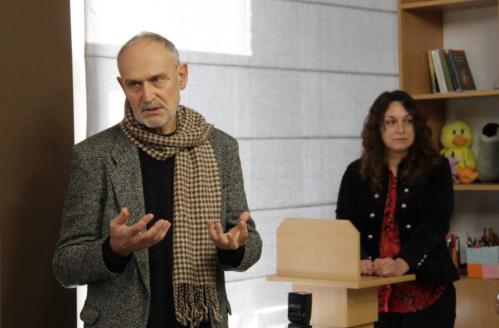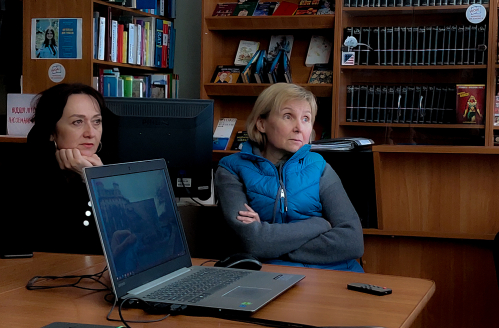Docudays UA travels continued on 20 and 21 October in Ternopil. On the first day, the festival was hosted by the Volodymyr Hnatiuk Ternopil National Pedagogical University. The audience of the Faculty of Pedagogy and Psychology welcomed us. And, it is pleasing that, despite the declared air raid alert, they returned to continue the meeting.

And it began with a special event of the Travelling Festival – a presentation by Oleksandr Stepanenko “50 Years of the Helsinki Final Act: History, Present, Perspectives”. It was presented on the occasion of the 50th anniversary of the adoption of the Helsinki Final Act of the Conference on Security and Co-operation in Europe.

For the fourth consecutive year, Ukraine is making terrible sacrifices in the war unleashed against it by the Kremlin dictatorship. Of course, we strive for peace. But this must be a just peace – one that does not destroy the foundations of international law and does not leave crimes of aggression, genocide, crimes against humanity, and war crimes unpunished.
From this perspective, it seems obvious that the “Helsinki Decalogue”, those ten principles of adherence to the international legal order formulated 50 years ago, remain relevant to this day. All countries are sovereign and equal in rights; their borders are inviolable. The use of military force or the threat of force in international relations is inadmissible; disputes between countries must be resolved peacefully. Interference in the internal affairs of states is inadmissible. At the same time, states undertake to respect human rights and fundamental freedoms, including freedom of thought, conscience, religion, and belief.
These principles must be confirmed by all European countries in new historical conditions, in a new international agreement. Such an agreement must re-establish legal guarantees of international security, cooperation between countries, and human rights.
Therefore, it is time for the adoption of a peculiar pact “Helsinki for the 21st Century” and the creation of effective institutions capable of controlling its implementation. Ukraine, which has suffered perhaps the most due to violations of international law and armed aggression, should be among the most active initiators of this process.
The next point in the programme of this festival day was the screening and discussion with experts of the film “My Sextortion Diary” by Spanish director Patricia Franquesa.
A lively discussion revolved around the question of how to prevent sexual blackmail and violence on the Internet from the perspectives of a Lawyer, a Psychologist, and an Educator.
This event took place within the framework of the all-Ukrainian information campaign “Sexual violence on the Internet: how to protect children”.

The experts in the discussion of the topic were: Taisiia Rubaniak – lawyer, head of the public organisation “Four women”,

Yuliia Vorobel – psychologist, leader of the organisation “Four women”

Nataliia Pasichnyk – Associate Professor at TNPU, moderator of the Docudays UA film club at TNPU.
* * *
And the next day, 21 October, Travelling Docudays UA visited the Ternopil Regional Universal Scientific Library. In the first half of the programme, our target audience was students and lecturers of the Faculty of Law of the Western Ukrainian National University.

It began with a special event – the presentation “Fiat iustitia! – Let Justice Be Done!” Its content was a legal commentary on the historic decision of the Grand Chamber of the European Court of Human Rights (ECHR) on the interstate complaint of Ukraine and the Netherlands against the Russian Federation dated 9 July 2025. This case is justifiably considered the largest and most significant among all interstate cases examined by the ECHR in all years of its activity. As is known, the Grand Chamber established that in connection with the downing of flight MH17, the absence of an effective investigation, effective legal remedies, and the suffering inflicted on the relatives of the victims, Russia violated Article 2 of the European Convention on Human Rights and Fundamental Freedoms, and Articles 3 and 13 of the Convention respectively.
But the decision of the ECHR Grand Chamber on the aforementioned interstate complaint is not limited to this part. Its thorough analysis can be found at the link https://zib.com.ua/ua/154706.html
The programme continued with a film directly related to the theme of the mentioned presentation – a screening and discussion of the film by Dutch director Maarten de Schutter, “My Golden Child”. The author attempts to recreate the memory of his mother, who died when the civilian flight MH17 was shot down by the Russian military in 2014. This is a story about only one life that was cut short by that war crime. There were 298 such lives in this case alone.

In the evening hours, the film “Fiume o Morte!” by Croatian director Igor Bezinović, who was born in the city of Rijeka, once called Fiume, was presented to a free audience. This film is truly a “rare resource” in our programme this year. It is no coincidence that it became the winner of the Rotterdam Film Festival, one of the most prestigious in Europe. Interestingly, it was created by a joint film crew from Croatia, Italy, and Slovenia...
The residents of Rijeka themselves act in his film, retelling and re-imagining the history of their own city. And the history of Fiume-Rijeka is very similar to the history of Lemberg-Lviv, Stanislaviv-Ivano-Frankivsk, Tarnopol-Ternopil... Over the town halls of those cities of ours during the 20th century, the colours of state flags also changed 8 times. Each of these cities in the past was multi-ethnic. Each experienced periods of dictatorships and chaos, pogroms, political repression, and ethnic cleansing. In the director's focus is the figure of Gabriele D'Annunzio, an Italian poet, a harbinger of the fascist dictatorship in Italy.
Among other things, the film touches on the topic of the responsibility of cultural figures for keeping people within the bounds of that culture. The topic is not far-fetched – history has many cases where societies seemingly fell out of culture – as a result of wars, revolutions, and the establishment of totalitarian regimes with their aggressive propaganda. This was the case in Nazi Germany, the Bolshevik USSR, and Fascist Italy. This has happened in Putin's Russian Federation...
We believe that culture itself is not to blame for this "falling out of culture", at least if it is rooted in European civilisation with its humanistic ideal. So, Kant and Goethe are not to blame for the triumph of Nazism. Dante and Petrarch were not involved in the emergence of Mussolini's fascist dictatorship. Tolstoy and Chekhov are not responsible for the crimes of Stalinism... Probably, something happens to people, as a result of which they seem to lose the ability to adequately perceive their own culture and become tools in the hands of demagogues, power-hungry politicos, and simply criminal individuals.
Mariana Darmohray, student: “The film reveals complex connections between art and politics, showing how a writer's popularity can be used to justify lawlessness. At the same time, the film invites viewers to reflect on the present. By giving a voice to the people of modern Rijeka, it links past events to contemporary discussions about nationalism, identity, and historical memory. The poetic cinematography and thoughtful narration create a reflective tone that encourages critical thinking. ‘Fiume o Morte!’ is not just a historical documentary, but a reminder of the consequences of a blind pursuit of power and ideology devoid of legal and humanistic values.”
Yuliia Hrad, student: “This film is a powerful and unconventional story about one of the controversial episodes of 20th-century European history. In 1919, Italian poet and World War I veteran Gabriele D’Annunzio led a crowd of soldiers, captivated by his patriotic speeches, to seize the city of Fiume and establish an autocratic dictatorship there. For 16 months, the city became a strange experiment – an unleashing of arbitrariness, violence against ethnic minorities, looting, and chaos. The authors depict those events by no means heroically, but with utmost frankness and strong energy. Using interviews, archival materials, grotesque theatrical action, and creative visual language, the directors show how residents of the city, now called Rijeka, remember and reinterpret this page of their past. The contrast between official history and personal memories gives the story depth and complexity. The film raises important questions about power, freedom, identity, and historical memory. This is an atypical historical film. It is tense and sometimes uncomfortable, but leaves a strong impression. It shows that history is not just something written in books; it is something that lives in the memory, consciousness, emotions, and culture of people.”
Olha Yurkevych, student: “I was deeply impressed by watching the film ‘Fiume o Morte!’. The film captivated me with its atmosphere and substantial plot – from the very beginning, it immerses you in a complex historical period where the struggle for ideals intertwines with the personal ambitions of the characters. I particularly liked how the director conveyed the spirit of the time through music, costumes, and details. The film makes you think about what true freedom is and where the line lies between devotion to an idea and fanaticism. This is not just a historical drama – it is a story about human emotions, choice, and consequences. After watching it, I felt as if I had actually lived through these events.”
Nazar Martyshchuk, student: “The film depicts the consequences of the First World War and the collapse of the Austro-Hungarian Empire: political instability, the emergence of self-proclaimed dictatorships, new nation-states, and territorial conflicts between them. This film is not for children; it is truly difficult to watch without tears. But for adult viewers, it is very useful. In addition to creative immersion in historical events, it touches upon urgent problems of our time.”
And finally, we also recalled Wilhelm Reich, an outstanding social psychologist, our countryman from Northern Bukovyna, who witnessed the growth of German Nazism in the 1930s and in his book “The Mass Psychology of Fascism” set out his own thoughts: “Fascism is not the work of some Hitler or Mussolini, but the expression of the irrational structure of mass man... Fascism serves only as the organised political expression of the character structure of the average man, the existence of which is not limited to certain races, nations, and parties, but is general and international in character.”
Ultimately, in one of the scenes of the film, a woman met on the street of Rijeka also speaks about this: “Fascists are still here. We just don't know who they are.”

We sincerely thank the Ternopil Regional Scientific Library and the Volodymyr Hnatiuk Ternopil National Pedagogical University for their cooperation and interest in the events of Travelling Docudays UA in the Ternopil region, and the students – for their interest in the topics raised.
Life goes on – we will meet again!